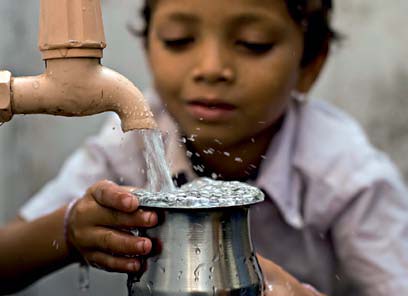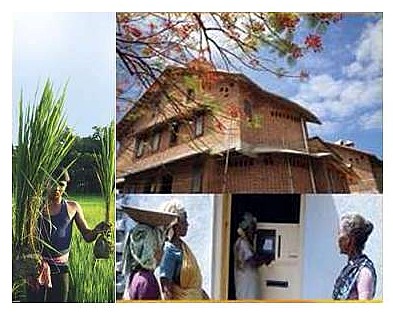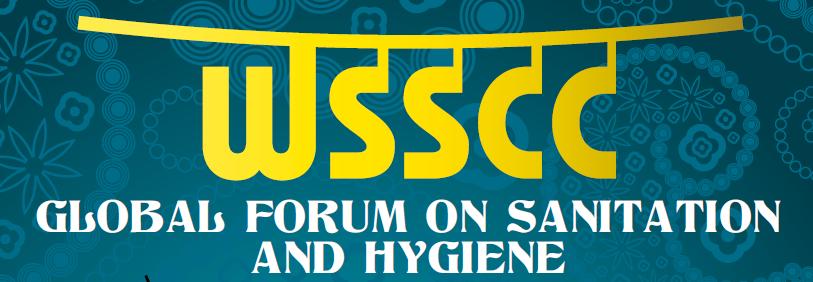Groundwater
Alternative national water policy - A critique - Economic and Political Weekly
Posted on 30 Oct, 2011 04:04 PMThis article published in the discussion section of the Economic and Political Weekly is a critique of the National Water Policy: An alternative draft for consideration, proposed by Ramaswamy Iyer, published in the Economic and Political Weekly, June 25th 2011.
Sustainable resources management for food security and sustainable livelihoods - Action - A Newsletter of AFPRO
Posted on 30 Oct, 2011 07:46 AMThese technologies include soil and water conservation measures, integrated farming, diversion based irrigation systems, sustainable agriculture, tree-based farming to name a few.
Where and how is the state - Accessing water and the state in Mumbai and Johannesburg - Journal of Asian and African Studies
Posted on 29 Oct, 2011 05:28 PMThis paper published in the Journal of Asian and African Studies examines the argument that the political and institutional contexts of service delivery shape people's access to the state and its resources and also the mediation between citizens and g
Towards drinking water security in India: Lessons from the field – A report by Water and Sanitation Program
Posted on 29 Oct, 2011 11:33 AM This report by the Water and Sanitation Program of the World Bank provides an account of the field level initiatives on drinking water security in India. The country faces many challenges in ensuring reliable, sustainable safe drinking water supply to rural households.
This report by the Water and Sanitation Program of the World Bank provides an account of the field level initiatives on drinking water security in India. The country faces many challenges in ensuring reliable, sustainable safe drinking water supply to rural households.
Though, in terms of provision of safe drinking water, more than 90 percent of the rural households have been covered, according to the NSSO 65th round survey 2008-09, much remains to be done to improve levels of service delivery, water quality and sustainability.
Mapping drought patterns and impacts: A global perspective – A research report by IWMI
Posted on 26 Oct, 2011 08:11 PMThis study by the International Water Management Institute (IWMI) examines the global patterns and impacts of droughts through the mapping of several drought-related characteristics – either at a country level or at regular grid scales. Characteristics cover various aspects of droughts – from global distribution of meteorological and hydrological drought risks to social vulnerability and indices related to water infrastructure.
An overview of arsenic in groundwater in Tamil Nadu – A report by Water Resources Department
Posted on 26 Oct, 2011 06:03 PMNow-a-days heavy metal arsenic poses a health risk problem throughout the world. Arsenic may be found in water which has flowed through arsenic-rich rocks. Severe health effects have been observed in populations drinking arsenic-rich water over long periods in countries world-wide.
Evaluation of operation and maintenance of sewage treatment plants in India - Control of urban pollution series - CPCB (2007)
Posted on 26 Oct, 2011 03:39 PMThis study was commissioned recognizing the fact that discharge of untreated sewage occurs not only because of inadequate installed capacity of sewage plants, but also due to the inadequate maintenance of existing plants.
Piloting Knowledge Swaraj - A hand book on Indian science and technology - KICS
Posted on 24 Oct, 2011 04:23 PMThis hand book on Indian science and technology was produced at the end of a project entitled “Science, Ethics and Technological Responsibility in Developing and Emerging Countries” (SET DEV) by Knowledge in Civil Society (KICS). The project aimed at:
- Activating processes of building institutional capacities and skills on science,ethics and STR socialization
- Defining and understanding perspectives of socialization of science and technology that take into consideration local needs in a multilateral dialogue.

Live feed: WSSCC Global Forum on Sanitation & Hygiene - 9-14 October 2011, Mumbai
Posted on 13 Oct, 2011 10:22 AM
We all know the statistics: 2.6 billion people around the world are without access to a basic toilet. Diarrhoea – the vast majority of it due to poor sanitation and hygiene – is the second biggest killer of children worldwide.
Between us, we also have many of the answers. We have experiences of low-cost technologies that are acceptable and affordable for poor communities in rural areas. We have been involved in designing communications programmes that have contributed to sustained behaviour change.
We have seen governments and civil society working together to set up policies and programmes that ensure access to better sanitation in challenging settings, such as crowded informal settlements in fast-growing megacities. We have also seen businesses grow up around sanitation and hygiene, allowing individuals to make a dignified living and clients to buy the sorts of products and services they want and need.
Social exclusion and policy recommendations for the 12th Plan - WASH News and policy update
Posted on 11 Oct, 2011 09:52 PMContent courtesy: India WASH Forum




